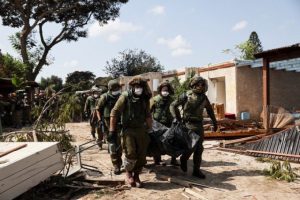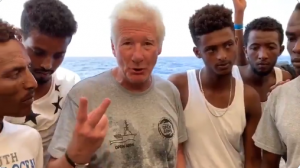As food and the means to buy it dwindled in a city under siege, the young mother felt she could do no more. She killed herself, unable to feed her children.
In a Catholic church across town, flour and oil to make communion wafers will soon run out. And the flagship hospital in Mekele, the capital of Ethiopia‘s Tigray region, wrestles with whether to give patients the expired medications that remain. Its soap and bleach are gone.
A year of war and months of government-enforced deprivation have left the city of a half-million people with rapidly shrinking stocks of food, fuel, medicine and cash. In rural areas, life is even grimmer as thousands of people survive on wild cactus fruit or sell the meager aid they receive. Man-made famine, the world’s worst hunger crisis in a decade, has begun.
Despite the severing of almost all communication with the outside world, The Associated Press drew on a dozen interviews with people inside Mekele, along with internal aid documents, for the most detailed picture yet of life under the Ethiopian government’s blockade of the Tigray region’s 6 million people.
Also Read | Kenyan President Uhuru Kenyatta to be the first African leader to meet Joe Biden
Amid sputtering electricity supplies, Mekele is often lit by candles that many people can’t afford. Shops and streets are emptying, and cooking oil and baby formula are running out. People from rural areas and civil servants who have gone unpaid for months have swelled the ranks of beggars. People are thinner. Funeral announcements on the radio have increased.
“The coming weeks will make or break the situation here,” said Mengstu Hailu, vice president for research at Mekele University, where the mother who killed herself worked.
He told the AP about his colleague’s suicide last month as well as the deaths of two acquaintances from hunger and a death from lack of medication. “Are people going to die in the hundreds and thousands?” he asked.
Pleas from the United Nations, the United States, the European Union and African nations for the warring sides to stop the fighting have failed, even as the U.S. threatens new sanctions targeting individuals in Africa’s second-most populous nation.
Instead, a new offensive by Ethiopian and allied forces has begun in an attempt to crush the Tigray fighters who dominated the national government for nearly three decades before being sidelined by Prime Minister Abiy Ahmed, the 2019 Nobel Peace Prize winner.
Ethiopia is one of the top recipients of U.S. humanitarian aid. The government in Addis Ababa, fearing the assistance will end up supporting Tigray forces, imposed the blockade in June after the fighters retook much of Tigray, then brought the war into the neighboring Amhara and Afar regions. Hundreds of thousands are now displaced there, widening the humanitarian crisis.
After the AP last month reported the first starvation deaths under the blockade, and the U.N. humanitarian chief called Ethiopia a “stain on our conscience,” the government expelled seven U.N. officials, accusing them of falsely inflating the scale of the crisis. The expulsions were “unprecedented and disturbing,” the U.S. said.
Also Read | Women left behind: Gender gap emerges in Africa’s vaccines
Just 14% of needed aid has entered Tigray since the blockade began, according to the U.N., and no medicine at all.
“There is no other way to define what is happening to the people of Tigray than by ethnic cleansing,” InterAction, an alliance of international aid groups, said this month of the conflict marked by mass detentions, expulsions and gang-rapes.
“The Tigrayan population of 6 million face mass starvation now,” former U.N. humanitarian chief Mark Lowcock wrote in a separate statement.
In response to questions, the spokesperson for the Ethiopian prime minister’s office, Billene Seyoum, again blamed Tigray forces for aid disruptions and asserted “the government has worked relentlessly to ensure humanitarian aid reaches those in need.” She did not say when basic services would be allowed to Tigray.
At Tigray’s flagship Ayder referral hospital, Dr. Sintayehu Misgina, a surgeon and the vice chief medical director, watches in horror.
Patients sometimes go without food, and haven’t had meat, eggs or milk since June. Fuel to run ambulances has run out. A diesel generator powers equipment for emergency surgeries only when fuel is available.
“God have mercy for those who come when it’s off,” he said.
No help is in sight. A World Health Organization staffer told Sintayehu there was nothing left to give, even though a warehouse in neighboring Afar was full of life-saving aid.
Scores of badly malnourished and ill children have come to the hospital in recent weeks. Not all have survived.
“There are no drugs,” said Mizan Wolde, the mother of a 5-year-old patient. Mehari Tesfa despaired for his 4-year-old daughter, who has a brain abscess and is wasting away.
“It’s been three months since she came here,” he said. “She was doing OK, then the medication ceased. She is now taking only oxygen, nothing else.”
Across Tigray, the number of children hospitalized for severe acute malnutrition has surged, according to the U.N. children’s agency — 18,600 from February to August, compared to 8,900 in 2020. The U.N. says hospitals outside of Mekele have run out of nutrition supplies to treat them.
“According to colleagues in the medical and agricultural sector, hundreds (of people) are dying each day, that’s the estimation,” Mekele University lecturer Nahusenay Belay said. He said one acquaintance died from lack of diabetes medication, and a young relative in the city’s outskirts starved to death.
“I’m surviving by the help of family and friends like anyone else,” he said.
Prices for essential goods are spiking. The U.N. last week said cooking oil in Mekele had shot up more than 400% since June and diesel more than 600%. In the town of Shire, swamped by scores of thousands of displaced people, diesel was up 1,200%, flour 300% and salt more than 500%.
The true toll of the deprivation in rural areas of the largely agricultural region is unknown as the lack of fuel prevents most travel.
One internal aid document dated last month and seen by the AP described thousands of desperate people who had fled “trapped and starved communities” near the border with Eritrea, whose soldiers have been blamed for some of the worst atrocities of the war.
“Most are able to eat at least one meal per day, largely thanks to the availability of cactus fruit,” the document said. “The situation is likely to deteriorate after September when wild fruits are exhausted.”
A document from another part of Tigray described “too many people to count” trying to sell items such as buckets and soap distributed by humanitarian groups. Some people walked straight from the distribution site to the roadside to sell.
“They have no option as they needed the money to buy food to supplement the inadequate food rations,” the document stated, adding the forecast for famine is “terrifying.”
A Catholic priest in Mekele, the Rev. Taum Berhane, described conditions echoing harsh tales from biblical times. Even before the war, parts of Tigray faced an invasion of desert locusts. Then hostile forces looted and burned crops and shot farmers’ animals. Now, the blockade means people are going hungry despite having money in the bank.
“You see lactating mothers with no milk,” he said. “We see babies dying. I saw myself people eating leaves like goats.”
While the church struggles to support camps for thousands of displaced people, “they are telling us, ‘Let us go back to our villages, even if there’s nothing there. It’s better to die at home.’”
The Catholic bishop in the town of Adigrat told him eight children have died at the hospital there, he said.
The priest, 70 years old and a diabetic, now watches his medication dwindle. His congregation’s spirits, too. With cash in Tigray running out, the collection plate is no longer passed at Mass. The bread for communion will be depleted soon.
“Even if I survive, am I going to preach to a vacuum if all humans perish?” he asked. “The only hope is, to be frank, these people have to stop fighting and talk for sustainable peace.”






